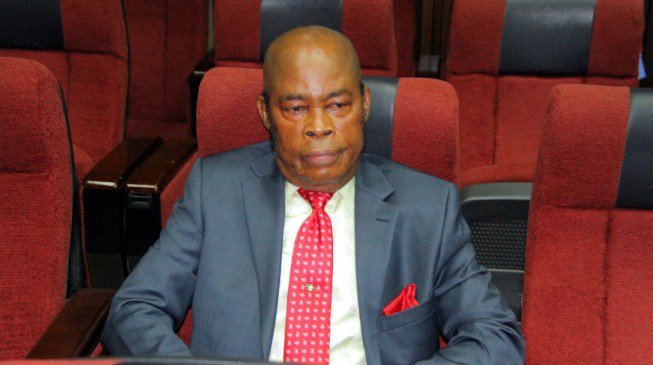The Federal High Court in Abuja on Friday dismissed all the 13 counts of money laundering and passport fraud instituted by the Federal Government against a serving Justice of the Supreme Court, Justice Sylvester Ngwuta.
Ngwuta was among the judicial officers whose houses were raided by the operatives of the Department of State Services in October 2016. He was subsequently charged with various corruption offences by the Office of the Attorney-General of the Federation.
After the prosecution had called four witnesses to establish its case, Justice Ngwuta filed an application praying for the trial court to dismiss the charges against him.
Ruling on the application, the trial judge, Justice John Tsoho, upheld the application by dismissing the charges.
Tsoho, whose ruling was anchored on an earlier judgment of the Court of Appeal, held that the pre-conditions for instituting charges against a judicial officer were not met before charging Justice Ngwuta.
The judgment of the Lagos Division of the Court of Appeal delivered on December 12, 2017, and which Justice Tsoho relied on, had dismissed the corruption charges instituted against a serving judge of the Federal High Court, Justice Hyeldzira Nganjiwa.
The appeal court had dismissed the charges instituted by the Economic and Financial Crimes Commission against the Federal High Court judge on the basis that a serving judge could not be investigated or prosecuted without being first disciplined by the National Judicial Council.
Justice Ngwuta’s counsel, Chief Kanu Agabi (SAN), had while arguing his client’s motion on February 28, 2018, submitted that by virtue of the said Court of Appeal’s judgment in Nganjiwa’s case and the provisions of section 158(1), Paragraph 21(8) of the Third Schedule to the Constitution, the charges instituted against his client were incompetent.
But, reacting, the lead prosecuting counsel, Mrs. Olufemi Fatunde, a retired Director of Public Prosecutions at the Federal Ministry of Justice opposed the application.
But ruling on Friday, Justice Tsoho held that some of the arguments of the prosecution “are largely inconsistent and self-defeating.”
Justice Tsoho ruled, “It is very significant to draw closer attention to the pronouncement of the Court of Appeal at page 19 of the judgment in Nganjiwa case which Mrs. Fatunde, a learned counsel, laid heavy emphasis on.
“The relevant portion of that judgment, contained in paragraph 2 at page 19 thereof reads as follows: ‘it must be expressly stated that if a judicial officer commits theft, fraud, murder or manslaughter, arson or the like, which are crimes committed outside the scope of the performance of his official functions, he may be arrested, interrogated and prosecuted accordingly by the state directly without recourse to the NJC.’
“This court holds the respective view that the use of the phrase: ‘He may be arrested,’ is very instructive. This is because the word ‘may’ connotes permissiveness, as opposed to being compulsory or mandatory. It shows that the Court of Appeal was being courteous in its use of language when it did not use any of the words: ‘must or shall,’ in that regard.”
Justice Tsoho said, based on the Court of Appeal’s decision in the Nganjiwa case, he was of the view that, “for the purpose of averting such uncertainty, that it is preferable that the NJC be allowed to first scrutinise allegations against judicial officers in all facets of crimes before the involvement of law enforcement agency or agencies.”
The presiding judge said until the constitution was amended in that regard, any direct arrest and/or prosecution of a judicial official, as in the present case, should be declared a nullity.
He set aside the proceedings so far conducted in the case, dismissed the charges and discharged Ngwuta.
:VANGUARD





2 Comments